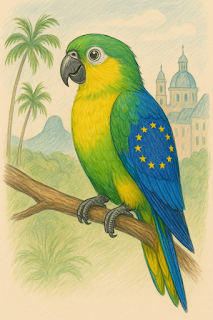Interoperability across the Atlantic
Many thanks to Professor Nico Zingales and Brazilian/European colleagues who organised and spoke at the fascinating online conference, Interoperability in Digital Platforms and its Regulation: a Transatlantic Dialogue (see this tremendously insightful (and colourful!) contribution already from speaker Prof. Simonetta Vezesso — with her beautiful Euro-Brazilian canary perched in front of Sugar Loaf mountain included with permission above!)
This type of comparative approach is always very powerful when countries try to pass legislation with similar, although not identical, objectives. I hope our discussion was useful for the Brazilian government and Congress as they finalise the shape of a Brazilian ex ante regulation law for digital markets (quite similar in its shape to the UK’s Digital Markets, Competition and Consumer Act 2022).
As a Canarian, I was also delighted to participate in a discussion following the trade winds (alisios en español) which have had such a gigantic historical geopolitical impact. Will Europe’s digital markets galleons be more welcome in Latin America than their genocidal forebears? And what precious resources will Brazil and its neighbours return to Europe in turn — under genuinely cooperative, rather than extractive and exploitative conditions?
I tried to keep my own comments during my panel brief to leave time for Q&A — the eternal problem of events with a long list of excellent speakers 😊 Here are the short points I tried to make, in under 9 minutes! I will expand them a little in this post over the next few days, but you can also watch the video itself (my contributions are here and here).
The DMA’s implementation has (of course) illustrated issues of law in books vs law in action (Pound, 1920). Let me highlight nine problems we have seen for effective interoperability:
- Urgency — EU leapfrogged UK. Brazil Marco Civil and Supreme Court actions against X/Twitter has been impressive. UK frustration from publishers and others affected very strongly by lack of enforcement. Heard LOUDLY at meeting at House of Lords last month, and at Apple and Google DMA compliance workshops yesterday and today. Please ask EC for access to the video and Slido questions asked!
- Importance of international cooperation by the democracies, to speed up, and to enforce collectively against world historically valuable firms who have pushed back very strongly indeed, in courts, policy, tech, and court of public opinion. Apple case against CMA action, only won by CMA at Court of Appeal. Given new government attitude, is this the last chance for UK DMCCA regime? UN IGF. Importance of cohesive and complementary action by the democracies! Sharing information, analysis, open source code. And PSBs! Start with a spun out Chrome as DoJ is looking at?
- Interoperability is COMPLEX and NRAs and governments suffer very powerfully from information asymmetry. Which law firms and technology experts exist genuinely independently from Big Tech? Computer science mindset is SO different to the legal mind, as important as the latter is, but there is a great struggle by both sides to communicate with each other.
- Gatekeepers have (so far) managed to limit benefits to EU residents. Matter ultimately of comity, jurisdiction and international law? Pressure to limit via trade agreements (and indeed to limit DMA enforcement overall from the USA)
- DMA unfortunately (as civil society warned) loads costs onto the access seekers, not the gatekeepers. One way to address is via public funding of software libraries — aka DPI.
- Detailed Art. 7 NIICS interop is good for protecting details such as in particularly data protection/privacy and E2EE. But they struggle in generality (eg application to e-mail?) and will date quickly. Is the higher-level prohibition on self-referencing effectively used by 6(7) a better approach? Nico’s mention of FSM equitable interop point. FSM report on messaging interop extension to social media:
- That said, Art. 7 has detailed mechanisms for updating itself, and broad generality has its own problems, not least endless argumentation and pushback from the regulated parties — the very problems ex ante regulation is supposed to fix over ex post antitrust. EC limited enforcement resources and interpretation of DMA.
- As a career-long security and privacy expert myself — as strongly as I advocate for the protection of human rights (fundamental rights in EU law) — they have mainly been used as an anticompetitive strategy by Apple in particular. My independent assessment commissioned by Meta explains this in detail, and is published as an FGV discussion paper at
- The EU Court of Justice’s Android Auto decision — FINALLY something to stop the rise of platformisation?
